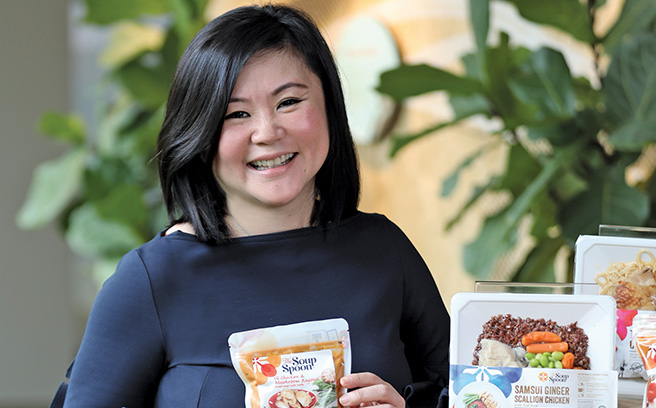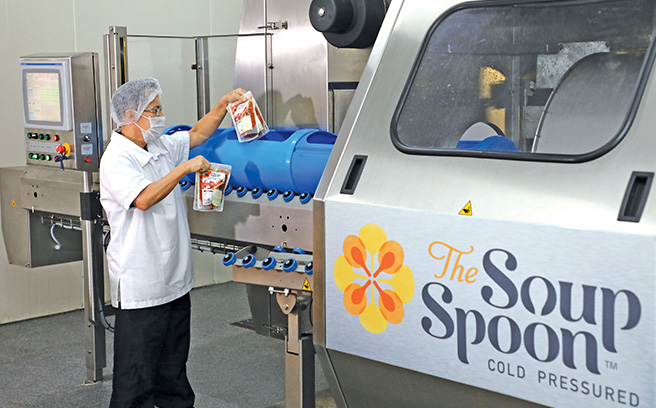
When The Soup Spoon realised that its customers were buying soups and storing them in styrofoam cups for next-day consumption, it decided to embark on the creation of take-home soup packs in 2003.
There was a problem though. “By the time we send the packs to retailers and they send them to their outlets, there are only seven days left before the packs expire. And because stores generally remove food items from their shelves three days before the expiry date, they have only four days to sell the soup packs – so most of them did not want to carry these products,” said Ms Anna Lim, the company’s Executive Director.
As the company’s philosophy is to provide food that is convenient and nutritious, using preservatives was out of the question.
A winning solution
It was during a work trip to New Zealand in 2014 that The Soup Spoon came to know about High Pressure Processing (HPP) technology.
HPP is a natural, environmentally friendly process that uses ultra-high pressure to kill food-borne pathogens in packaged refrigerated products, while maintaining flavour and nutritional properties. It can triple the shelf life of products, depending on their contents, without using chemicals or additives.

Adopting the technology was not without obstacles. “As no one had the HPP machine in Singapore, there was no way of testing if the technology would suit our products,” Ms Lim explained.
In 2015, the company took some of its soup packs to Hiperbaric – a world leading manufacturer of HPP equipment for the food industry – in Spain, for testing.
Satisfied with the test results, The Soup Spoon decided to purchase a HPP machine despite its high cost, with assistance from SPRING Singapore’s (now Enterprise Singapore¹) Capability Development Grant². The soup packs with longer shelf life were rolled out in 2017.
More business growth
As one of the early adopters of HPP technology in Singapore, Ms Lim believes that the benefits brought about by the technology was worth the journey.
“With HPP, we can get up to 120 days of shelf life compared to just 14 days previously, without having to tweak our recipes or compromise on taste. This allows us to enter new domestic retail channels and export our soups,” Ms Lim explained.
For instance, The Soup Spoon’s soup packs can now be found on the shelves of Citysuper, a premium retail chain in Hong Kong – a result of a deal that the company struck in 2017.
“Advanced food processing technology has given us a way to grow the business and our distribution channels, and not depend solely on our own F&B stores to generate sales,” said Ms Lim.
In 2017, The Soup Spoon saw a 30% increase in the sales of its soup packs.
Innovating with technology
The Soup Spoon’s success has given it the confidence to expand the HPP technology to its ready meals, such as Thai glass noodles, cauliflower quinoa rice and samsui chicken.
Compared to a three-day shelf life previously, the ready meals can now last up to 28 days. “This is a long time for chilled and preservative-free ready meals, which generally expires in less than a week, and gives us a competitive edge in the market.”
In addition, The Soup Spoon has developed an innovative way to generate a positive return on its investment – by collaborating with other companies to boost the utilisation rate of its machine.
It has worked with local fitness centre, GymmBoxx, and food services company, The Common Good Company, to increase the shelf life of their food products.
Additionally, The Soup Spoon has partnered Workforce Singapore to offer master classes on the HPP technology, and promote and extend the use of its facility to other F&B companies in Singapore.
It hopes that these collaborations will boost Singapore’s ready meals market and raise awareness of advanced food technology and its benefits for the food industry.
Going places
Expansion of distribution channels in markets such as South Korea and China are also on the cards.
“There are not many players in the South Korean market that sell soups in chilled format, with long shelf lives and has no preservatives. We are in a unique position to supply these soups,” Ms Lim added.
On why expanding into these markets are important, Ms Lim said that the ready meals market in Singapore will soon become saturated with competition.
“That’s why it is important to be open to technology and innovation, to be able to stay competitive in the long run.”
Read all stories here.

